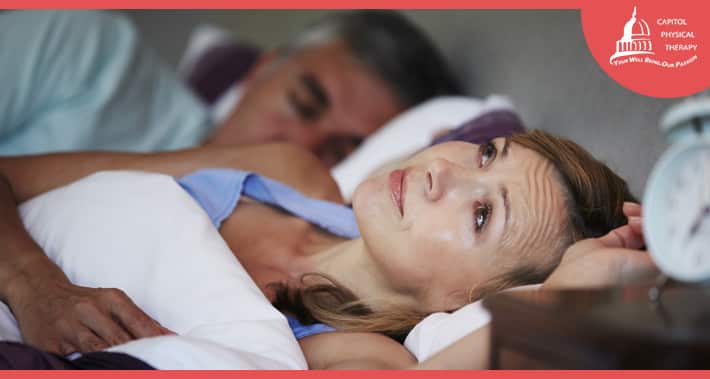
Physical therapy may not be the first place you think to look when facing issues due to menopause.
As we age, our hormone levels shift.
A decrease in estrogen and progesterone levels is a very natural part of aging, and results in menopause.
Menopause occurs when you miss your period for 12 consecutive months, and the transition into this phase of life can be accompanied by a number of uncomfortable symptoms.
Also referred to as “the change”, this period of life can be stressful, painful, and at times unpleasant.
Menopause can also occur in cases of surgery that affect hormone production, such as with a hysterectomy.
Here at Capitol Physical Therapy, we provide physical therapy for women in Washington who are experiencing menopause and other physical issues.
Let’s take a look at the ways in which physical therapy can help you during this phase of life.
How Can Physical Therapy Help With Menopause?
Menopause causes several physiological changes, occurring on both a musculoskeletal level and, especially in cases where childbirth has occurred, on the pelvic floor.
Often, the symptoms of menopause are simply the symptoms of aging, exacerbated by the onset of changing hormones.
This makes it an important factor when considering physical therapy for seniors.
Exercise at this time of your life helps to regulate your hormones.
Building strength through targeted movements has also proven to ease uncomfortable symptoms.
Recent studies have indicated that exercising beyond menopause as you age is noncontroversial and incredibly beneficial for your orthopedic health.
If you’re going through menopause, here are some examples of how Washington DC physical therapy can help you.
1. It Helps Maintain Bone Density
Estrogen loss can cause a reduction in bone density, which means that the production of new bone tissue slows down.
This is also called osteopenia, which means that you have lower bone density than you normally should.
In many cases, the result is osteoporosis, which is a serious condition affecting millions of people in the United States.
Osteoporosis causes your bones to weaken and become brittle, breaking easily.
It is estimated that approximately 50% of women in the United States will break a bone due to issues with osteoporosis.
The best way to prevent osteoporosis is early intervention, including strength training and running.
Increasing your muscle strength also encourages your bones to strengthen by creating new bone tissue to support the growing muscles.
This is called Wolff’s Law.
As you approach menopause, it is important to encourage bone growth, as you can lose as much as 6% of bone tissue over the first three years that you begin to experience menopause symptoms.
Physical therapy using resistance bands, free weights, and weight machines will target your muscles and build strength.
You can also supplement these exercises with yoga, which can help to reduce your risk of developing osteoporosis and improve your mental health.
Your physical therapist will build a strength training program to help you maintain a healthy bone density as you age.
2. It Helps Manage Hot Flashes & Weight Gain
You may be wondering how physical therapy could help with hot flashes, but the truth is that regular aerobic exercise can help to keep your hot flashes in check.
It can also help to improve other symptoms like depression, anxiety, and insomnia.
While more research is required to understand this relationship more thoroughly, it has been demonstrated to improve thermoregulatory control in non-menopausal women by lowering your core body temperature and changing your body’s threshold for sweating.
As an added bonus, the weight gain that normally occurs due to hormone imbalances can be tempered.
As you enter menopause, your pelvic muscles may suffer from prolapse, which is when the organs shift and cause weight to redistribute in the body.
A physical therapist can suggest core exercises to strengthen your pelvic floor muscles and reduce discomfort.
Regular exercise also helps to regulate the changing hormone levels in your body, which will also reduce the severity of your symptoms.
3. It Helps Relieve Painful Sex
Pain before, during, or after intercourse, also known as dyspareunia, is nothing to be ashamed of.
Estrogen depletion can cause thinning tissue, which leads to vaginal dryness, irritation, or pain during sex.
The pelvic tissue and muscles may also become weakened or tight, particularly in cases where you have given birth.
Lower back pain and pelvic pain is also an issue for many women as they age.
Plus, if you’re dealing with these symptoms, you may also find that your libido is low during menopause.
Physical therapy can help to relieve all of these symptoms.
We can teach you targeted exercises to strengthen the pelvic floor and relax tight muscles.
Depending on what your symptoms are, we might also recommend dry needling to supplement your treatment plan.
Body changes at this time of life are common, but they can be upsetting and embarrassing to discuss with your doctor.
But there’s no need to struggle.
Look to physical therapy to help you feel yourself again.

4. It Helps Relieve Insomnia
It’s no surprise that with hot flashes and the need to urinate more frequently, insomnia is a common side effect of menopause.
But sleep is one of our best weapons in the struggle to regulate our hormones and allow our bodies to maintain healthy processes.
Physical therapy can help by teaching you exercises to sleep better.
Whether your workout is high or low impact, if your changing body means you no longer feel as fit as you used to, don’t worry, we can help.
Soft tissue manipulation is also a good way to fight insomnia, relieve stress, and reduce headaches if you are suffering.
5. It Can Help Manage Urinary Incontinence
We’ve all seen the Depends adverts that always feature older women.
It’s no secret that childbirth can lead to incontinence down the road.
But there’s no reason you can’t regain your independence by strengthening the muscles that no longer work the way they used to.
Pelvic floor dysfunction can manifest in many of the ways discussed above, but one of the primary symptoms of weakness in the pelvic muscles is incontinence.
Don’t let this stop you from doing the things that you want to do.
Your urinary incontinence physical therapist will teach you exercises to strengthen the muscles that may have been damaged over time.
Your body will thank you for it.
Book Your Appointment With Capitol Physical Therapy Today
Menopause brings with it a unique set of health issues that cause so many women to suffer in silence every year.
But maybe it’s time to take control of your health with the help of a physical therapist.
We are specially trained to help you ease the transition.
Book your appointment with Capitol Physical Therapy today and let our therapists find a program that works for you.
Book your appointment with Capitol Physical Therapy today.
1331 H St NW #200,
Washington, DC 20005
- https://g.page/capitolptdc
9560 Pennsylvania Ave. # 202,
Upper Marlboro, MD 20772
- https://goo.gl/maps/zjL4NnnuThRhrcS86
Capitol Physical Therapy offers orthopedic and other pain related solutions, with our versitile team of physical therapists in Washington, DC